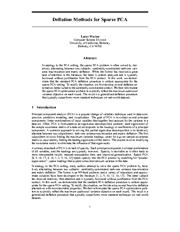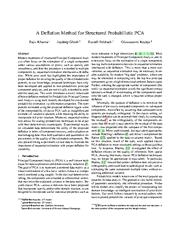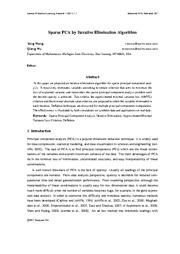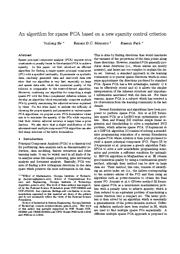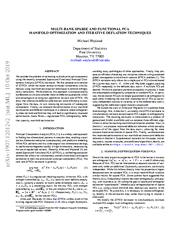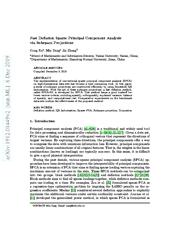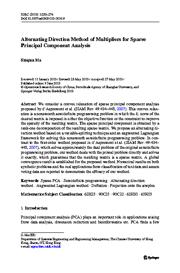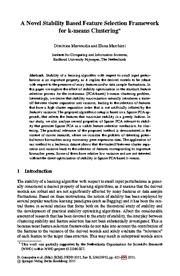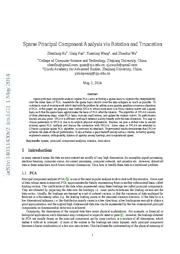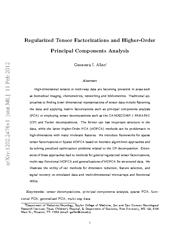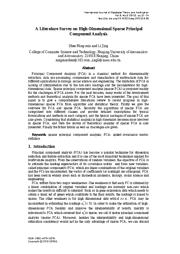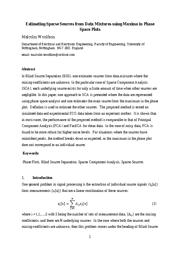A copy of this work was available on the public web and has been preserved in the Wayback Machine. The capture dates from 2022; you can also visit the original URL.
The file type is application/pdf.
Filters
Deflation Methods for Sparse PCA
2008
Neural Information Processing Systems
In this work, we demonstrate that the standard PCA deflation procedure is seldom appropriate for the sparse PCA setting. ...
In analogy to the PCA setting, the sparse PCA problem is often solved by iteratively alternating between two subtasks: cardinality-constrained rank-one variance maximization and matrix deflation. ...
We imbed the technique into the following algorithm for sparse PCA: Algorithm 1 Generalized Deflation Method for Sparse PCA Given: A 0 ∈ S p + , r ∈ N, {k 1 , . . . , k r } ⊂ N Execute: 1. B 0 ← I 2. ...
dblp:conf/nips/Mackey08
fatcat:l7z5orrd4fapnnzxyfeys37exm
A Deflation Method for Structured Probabilistic PCA
[chapter]
2017
Proceedings of the 2017 SIAM International Conference on Data Mining
This work introduces a novel, robust and efficient deflation method for Probabilistic Principal Component Analysis using tools recently developed for constrained probabilistic estimation via information ...
The components estimated using the proposed deflation regain some of the interpretability of classic PCA such as straightforward estimates of variance explained, while retaining the ability to incorporate ...
Deflation for Sparse Probabilistic PCA (soPPCA) The proposed deflation using the framework may also be extended to sparse Probabilistic PCA, where the support of components is to be restricted to a few ...
doi:10.1137/1.9781611974973.60
dblp:conf/sdm/KhannaGPK17
fatcat:vz6utipauzcslgasgdcpzea6pq
Sparse PCA by iterative elimination algorithm
2011
Advances in Computational Mathematics
In this paper we proposed an iterative elimination algorithm for sparse principal component analysis. ...
Deflation techniques are discussed for multiple principal components computation. The effectiveness is illustrated by both simulations on synthetic data and applications on real data. ...
Advanced methods include the SCoLTLASS (Jolliffe et al., 2003) , lasso based sparse PCA (SPCA, Zou et al. 2006) , direct sparse PCA (DSPCA, d'Aspremont et al. 2007 ), Greedy sparse PCA (GSPCA, Moghaddam ...
doi:10.1007/s10444-011-9186-3
fatcat:2pm76uovbfc3roln5aicfrgeni
All sparse PCA models are wrong, but some are useful. Part I: Computation of scores, residuals and explained variance
2019
Chemometrics and Intelligent Laboratory Systems
Article 25fa states that the author of a short scientific work funded either wholly or partially by Dutch public funds is entitled to make that work publicly available for no consideration following a ...
In GPCA, the deflation by Mackey [5] is used. He showed that the common approach of deflation in PCA is in general not valid for sPCA. ...
Tð5 Â 3Þ ¼ Fig. 2 shows the result of the simulation and the approximation of data X by the sparse factorization methods considered along with PCA. ...
doi:10.1016/j.chemolab.2019.103907
fatcat:tekukhoxevdrrfp2rhxb3zpnvq
All Sparse PCA Models Are Wrong, But Some Are Useful. Part II: Limitations and Problems of Deflation
2020
Chemometrics and Intelligent Laboratory Systems
Article 25fa states that the author of a short scientific work funded either wholly or partially by Dutch public funds is entitled to make that work publicly available for no consideration following a ...
Algorithms for sparse PCA 2 The original definitions of PMD [2] and GPCA [7] differ in how they fit components, as discussed in Section 3, and in how they deflate, PMD using projection deflation and ...
2] , the use of scores for deflation, or the projection of the sparse loadings to the row-space for subsequent deflation. ...
doi:10.1016/j.chemolab.2020.104212
fatcat:p2iqq7ljrjbvfm7urkeqxdhksa
An algorithm for sparse PCA based on a new sparsity control criterion
[chapter]
2011
Proceedings of the 2011 SIAM International Conference on Data Mining
Moreover, combining our algorithm for computing a single sparse PC with the Schur complement deflation scheme, we develop an algorithm which sequentially computes multiple PCs by greedily maximizing the ...
Sparse principal component analysis (PCA) imposes extra constraints or penalty terms to the standard PCA to achieve sparsity. ...
In Section 3, we present our method for computing multiple sparse PCs based on the single sparse PCA algorithm and the Schur complement deflation scheme. ...
doi:10.1137/1.9781611972818.66
dblp:conf/sdm/HeMP11
fatcat:vp2k6e47enc3lakfx32oypf7my
Multi-Rank Sparse and Functional PCA: Manifold Optimization and Iterative Deflation Techniques
[article]
2019
arXiv
pre-print
While effective, this approach is computationally burdensome so we also consider iterative deflation approaches which take advantage of existing fast algorithms for rank-one SFPCA. ...
We consider the problem of estimating multiple principal components using the recently-proposed Sparse and Functional Principal Components Analysis (SFPCA) estimator. ...
So far, we have only considered the behavior of the proposed deflation schemes for two-way sparse PCA. ...
arXiv:1907.12012v2
fatcat:4hl5ikdn4zaqbe4qlz3t2elxvi
Alternating Direction Method of Multipliers for Sparse Principal Component Analysis
[article]
2011
arXiv
pre-print
Global convergence result is established for the proposed method. ...
We propose an alternating direction method based on a variable-splitting technique and an augmented Lagrangian framework for solving this nonsmooth semidefinite programming problem. ...
The author is grateful to Alexandre d'Aspremont for discussions on using DSPCA. The author thanks Stephen J. Wright and Lingzhou Xue for reading an earlier version of the manuscript ...
arXiv:1111.6703v1
fatcat:m5txesaabjekjfcgtny2lpbyby
A Fast deflation Method for Sparse Principal Component Analysis via Subspace Projections
[article]
2019
arXiv
pre-print
With the aid of these subspace projections, a fast deflation method, called SPCA-SP, is developed for SPCA. ...
The implementation of conventional sparse principal component analysis (SPCA) on high-dimensional data sets has become a time consuming work. ...
Deflation method for PCA We first introduce the deflation in the context of PCA. Let X ∈ R n×d be a data matrix encoding n samples and d variables. ...
arXiv:1912.01449v2
fatcat:fiilhiasfzdzjnoigfky7nro4e
Alternating Direction Method of Multipliers for Sparse Principal Component Analysis
2013
Journal of the Operations Research Society of China
A global convergence result is established for the proposed method. ...
We propose an alternating direction method based on a variable-splitting technique and an augmented Lagrangian framework for solving this nonsmooth semidefinite programming problem. ...
Wright and Lingzhou Xue for reading an earlier version of the manuscript and for helpful discussions. ...
doi:10.1007/s40305-013-0016-9
fatcat:su7d33lowjb5hjf7l7oel77axe
A Novel Stability Based Feature Selection Framework for k-means Clustering
[chapter]
2011
Lecture Notes in Computer Science
In our study, we also analyze several properties of Sparse PCA relevant to stability that promote Sparse PCA as a viable feature selection mechanism for clustering. ...
In this paper we explore the effect of stability optimization in the standard feature selection process for the continuous (PCA-based) k-means clustering problem. ...
In our study of Stable Sparse PCA we derive several interesting results that are related to the suitability of Sparse PCA for feature selection in clustering and also, to the stability of the Sparse PCA ...
doi:10.1007/978-3-642-23783-6_27
fatcat:kjpu6fyk5rbcfg4dllr4a4lb5q
Sparse Principal Component Analysis via Rotation and Truncation
[article]
2014
arXiv
pre-print
Besides, we give a unified view to several existing sparse PCA methods and discuss the connection with SPCArt. ...
Sparse principal component analysis (sparse PCA) aims at finding a sparse basis to improve the interpretability over the dense basis of PCA, meanwhile the sparse basis should cover the data subspace as ...
But it is not the case for sparse PCA, the deflation method is greedy and cannot find optimal sparse loadings. However, the block group has the potential. ...
arXiv:1403.1430v2
fatcat:4l7bfmd7s5eu5mfeprexqrw4pq
Regularized Tensor Factorizations and Higher-Order Principal Components Analysis
[article]
2012
arXiv
pre-print
We introduce frameworks for sparse tensor factorizations or Sparse HOPCA based on heuristic algorithmic approaches and by solving penalized optimization problems related to the CP decomposition. ...
Extensions of these approaches lead to methods for general regularized tensor factorizations, multi-way Functional HOPCA and generalizations of HOPCA for structured data. ...
Sparse HOPCA via Deflation We introduce a novel deflation-based method for Sparse HOPCA that incorporates sparsity by regularizing factors with an 1 -norm penalty. ...
arXiv:1202.2476v1
fatcat:vcpxsaivfbfizfxs2lfn2ye7hu
A Literature Survey on High-Dimensional Sparse Principal Component Analysis
2015
International Journal of Database Theory and Application
For the past decades, many works of the development methods and theoretical analysis for sparse PCA have been presented. ...
Firstly we give the overview for PCA and sparse PCA. ...
Acknowledgements This paper is partially supported by Fundamental Research Funds for the Central University (NS2015092). ...
doi:10.14257/ijdta.2015.8.6.06
fatcat:6nt3kqwtjzhiznqj2ylzmbjnbi
Estimating Sparse Sources from Data Mixtures using Maxima in Phase Space Plots
[article]
2022
arXiv
pre-print
It is shown that, in most cases, the performance of the proposed method is comparable to that of Principal Component Analysis (PCA) and FastICA for clean data. ...
In the case of noisy data, PCA is found to be more robust for higher noise levels. ...
Figure 7 -Sources estimated using the maximum method applied to whitened data To summarise, for this example, the Maximum method works better than PCA for mixtures of uncorrelated sparse sources as it ...
arXiv:2208.08210v1
fatcat:fqepz7doebcxbpcxpeaodpx35m
« Previous
Showing results 1 — 15 out of 1,344 results

